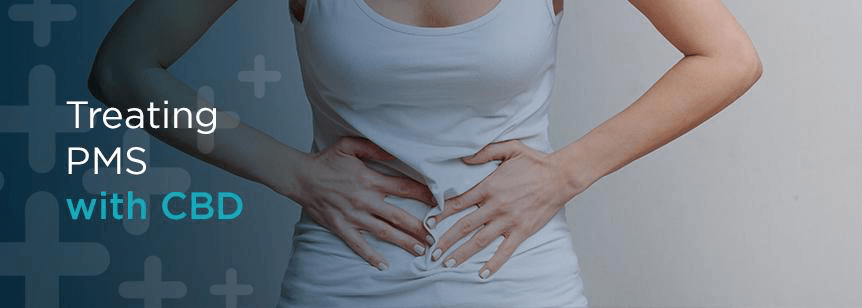
Premenstrual syndrome (PMS) affects as many as 3 in 4 menstruating people, according to the Mayo Clinic. Symptoms range from mood swings, irritability, and depression to headaches, acne flares, and joint and muscle pain. While most people have relatively mild symptoms, when PMS disrupts a person’s life to the point of being disabling, it is classified as premenstrual dysphoric disorder (PMDD).
Click here to see the full infographic.

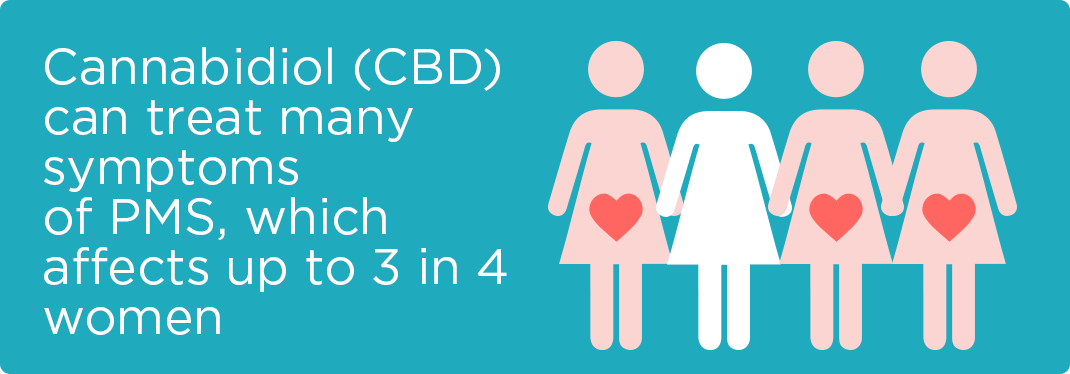
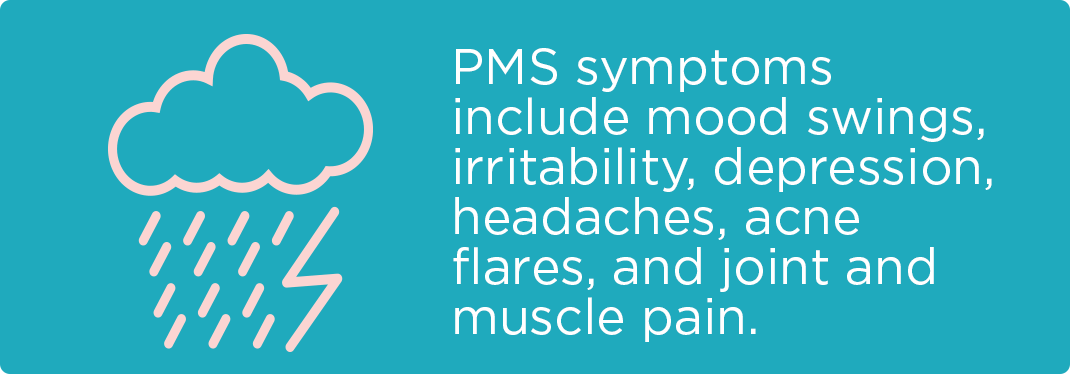
Lifestyle changes like eating a balanced diet, regular exercise, and stress reduction are front-line defenses for many people who experience PMS. For physical symptoms of PMS, such as headaches or muscle pain, over-the-counter NSAIDS like ibuprofen or naproxen are often recommended. Anti-depressants are sometimes recommended for the emotional symptoms of PMS, while hormonal contraceptives may be useful for both the physical and emotional symptoms of PMS. But if these options aren’t available to you, or you’re looking for alternatives, you may have heard that CBD can help with PMS. Here’s what you should know.
Cannabidiol, or CBD, is one of marijuana’s two main active ingredients, along with THC. While THC is associated with the high of marijuana, CBD doesn’t cause the same euphoria, and there is growing evidence to suggest that it has medicinal properties. CBD can be taken in combination with THC or on its own. While the World Health Organization says that “in humans, CBD exhibits no effects indicative of any abuse or dependence potential,” CBD derived from marijuana is still federally illegal. Learn more about CBD here.
While many people have spoken anecdotally about their experience with CBD reducing PMS symptoms, researchers haven’t yet been able to establish a clear link, and it may be more effective for some symptoms — like pain or anxiety — than others. Perhaps the best way to discuss the research that does exist for the benefits of CBD on PMS is to break it down by symptoms.
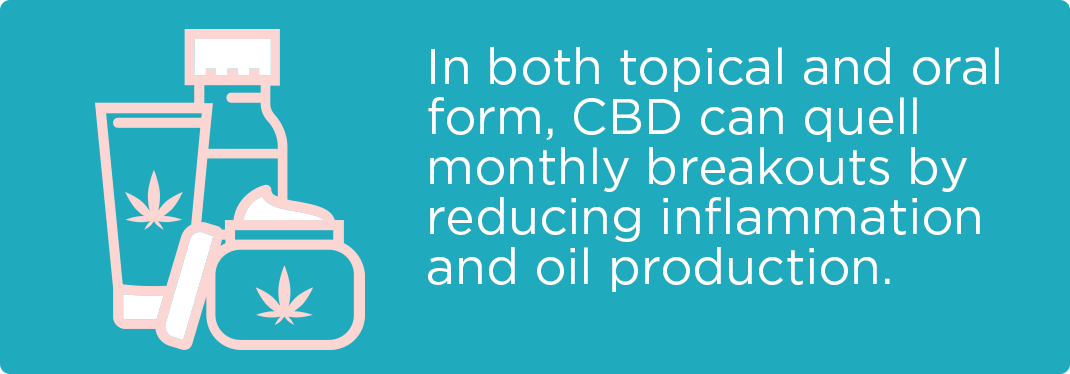
According to Harvard Medical School, treating pain is the most common use for medical marijuana in the United States. A 2017 study in Frontiers of Pharmacology found that CBD seemed to change the way rats reacted to pain from an incision. Meanwhile, a research review suggested that treatments combining THC and CBD (namely, a drug called Sativex) were effective in treating some types of chronic pain in humans. There’s even less evidence on CBD for headaches and migraines. However, a doctor for the American Migraine Foundation (AMF), Dr. Stephen Silberstein, says that it’s worth a shot for headache patients to try CBD while research is catching up. ““If you have a lot of neck pain or soreness, it is perfectly reasonable to use CBD oil. It may even prevent nausea and vomiting,” he told the AMF. So, while cannabis can be considered CBD a possibility for PMS-related pain, research hasn’t established it as an effective treatment.
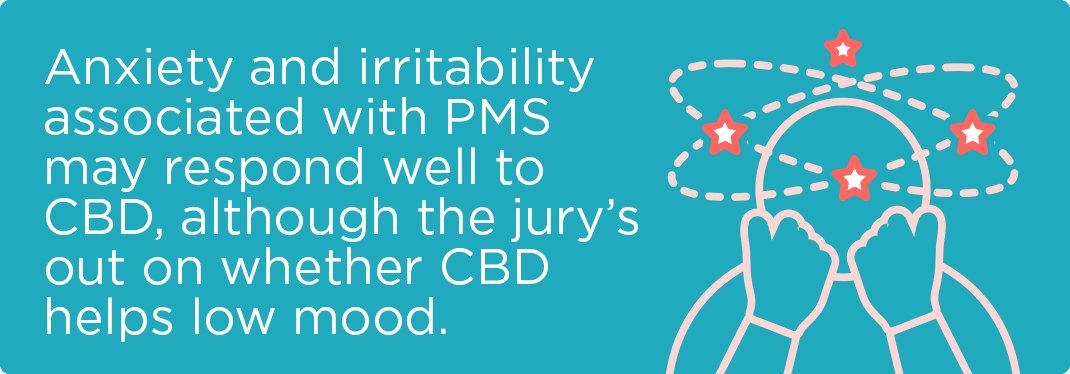
It depends on how your moods tend to swing. A 2015 research review published in Neurotherapeutics suggested that CBD oil could be a useful tool for anxiety management, particularly in one-off doses (rather than ingesting it on a regular basis). But a 2014 research review published in CNS and Nuerological Disorders found the opposite for CBD and depression. CBD did not seem to be useful as an anti-depressant, though human studies are still needed in order to confirm these findings. So CBD seems to be a more plausible treatment for anxiety during PMS than it would be for low mood.
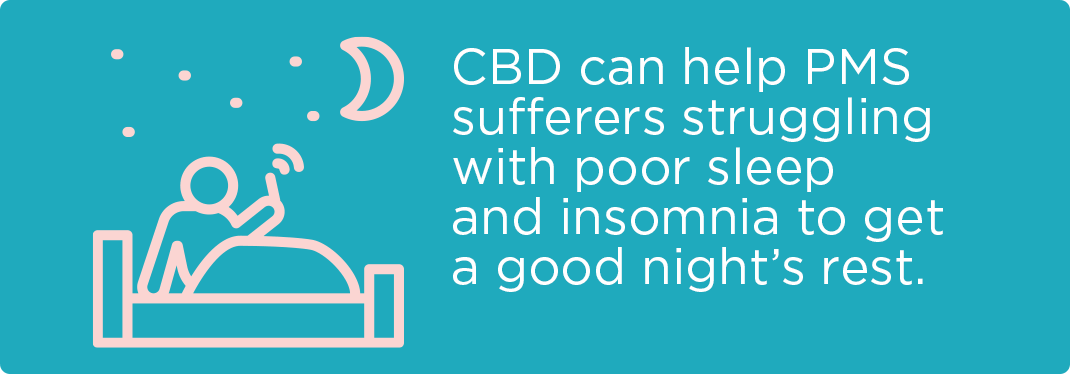
More research is needed on the role of CBD in improving sleep, but it may be beneficial for temporarily improving sleep during PMS. A 2017 research review in Current Psychiatry Reports suggests that CBD may be helpful to people suffering from insomnia. More specifically, in 2019 the Permanante Journal published a study in which 47 adults suffering from anxiety and 25 adults struggling with poor sleep received CBD capsules. Two-thirds of the study participants saw their sleep scores improve in the first month, though the improvements in sleep weren’t sustained over all three months of the study.

CBD skincare treatments are growing in popularity right now, and some claim to reduce acne flares. But is that true? It certainly could be. In 2014, The Journal of Clinical Investigation found that CBD seemed to have key anti-acne properites, including limiting oil production and providing an anti-inflammatory effect on oil glands. The authors recommended further studies of CBD, in both topical and ingested form, for treating acne.
No Information on MarijuanaDoctors.Com should be used to diagnose, treat, prevent or cure any disease or condition. You can view our Full Disclaimer here.